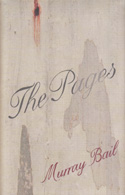 | Reviews of The Pages by Murray Bail Text Publishing 2008 |
From the publisher's page:
It was a privilege to be allowed into the mind of another person, the life work of another. She was curious to see what he had thought, what he had found. Already she respected his effort. It would have been difficult to sustain across the pages, the many years, the isolation, the heat, perhaps the silence.ReviewsWhat are the pages?
On a family sheep station in western New South Wales, a brother and sister work the property while their reclusive brother, Wesley Antill, spends years toiling away in one of the sheds, writing his philosophy.
Now he has died. Erica, a philosopher, is sent from Sydney to appraise his life's work. Accompanying her is Sophie, who needs distracting from a string of failed relationships. Her field is psychoanalysis. The pages Wesley wrote lie untouched in the shed, just as he left them. What will they reveal? Was he a genius? These turn out to be only a couple of the questions in the air. How will the visit change the lives of Erica and Sophie?
The Pages is a beguiling meditation on friendship and love, on men and women, on landscape and the difficulties of thought itself, by one of Australia's greatest novelists, the author of the much-loved Eucalyptus.
Jonathan Gibbs in "The Independent": "Bail's prose is as full of space and glaring, almost painful light as the landscape...This wouldn't be a novel if its characters didn't hide secrets, though in this delicate construction they appear with all the melodramatic force of a cup of tea being placed on a kitchen table. Bail's rhythm forms into a pattern, and we find we are reading twin accounts of opposing journeys.."
Patrick Skene Catling in "The Telegraph": "The Pages is a nicely written, wonderfully entertaining novel with optional depths about the discoveries of an Australian who devotes his adult life to an introspective search for truth...Philosophy is a big, difficult subject -- there is none bigger -- that Bail depicts thoughtfully and with sympathetic humour."
Stephanie Johnson in "New Zealand Herald": "Ironically, there are so few emotions anywhere in this novel, apart from those of self-regard and self-consciousness. The Pages may well be a novel that polarises its readers."
Hermoine Lee in "The Guardian": "Murray Bail plays a laconic, self-concealing game, cunningly luring the reader in to his interlinked stories. The Pages is not an easy or open book, but it is an oddly compelling one."
Geordie Williamson on ABC Radio National's "Book Show": "Murray Bail's new novel The Pages is an imaginative recapitulation of this meeting of Europe and the antipodean interior. In fact, like [Patrick] White, Bail's larger contribution to Australian letters has lain in his application of the form, style and aesthetic currents of post-war German-language literature to local subjects. "As such, his voice can be pessimistic, high-minded and cantankerous. It can seem at once anti-modern and avant-garde, lapidary and essayistic. A prose engine fuelled by intellect and contrariness, Bail's work recalls that of the fiery Austrian playwright and author Thomas Bernhard and, in its more lugubrious and melancholy aspects, that of the sublime antiquarian miserabilist WG Sebald, a German academic and writer based for decades in England's north-east."
Short Notices
"A Novel Approach" weblog: "To be honest, I was a little underwhelmed by The Pages. It is a short little thing that tries to talk about philosophy in an interesting and unusual way, but it is just too short and light to be very good at that. For me, a story like this needs to be either a short story, or a massive, sprawling novel. Instead, it kind of meanders around its characters, not really allowing them to be very much (the three women in particular), and kind of leaving you feeling a bit flat."
Anna Hood on "Boomerang Books" weblog: "My only concern is that readers who loved Eucalyptus may be disappointed in The Pages as it lacks the descriptive elegance and light humour of Bail's previous novel. Yet The Pages is an interesting and thought-provoking piece of modern literature."
"The Bookbag" weblog: "The hard truth is, this is one of those books that attempts to cover a lot of topics and ends up barely covering one or two. It has some really great ideas but lacks definition. The book parts add up (most of the time), but it does not read true or believable."
"The Economist" "The book subsides in the end into a pile of aphorisms, but this is not a displeasing finale. It has been worth the wait."
Interview
Susan Wyndham interviewed the author for "The Age".
